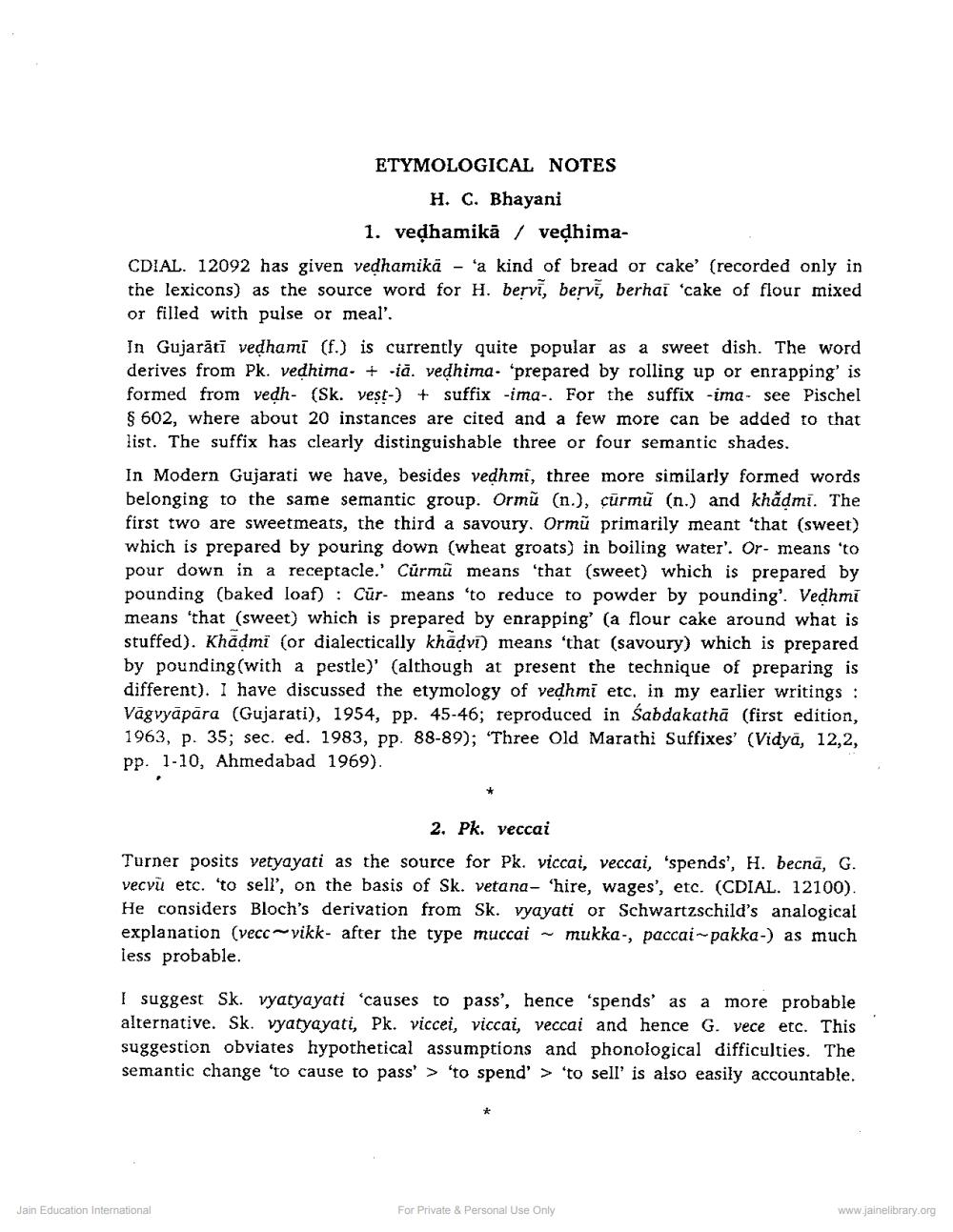Book Title: Etymological Notes Author(s): H C Bhayani Publisher: Z_Nirgrantha_1_022701.pdf and Nirgrantha_2_022702.pdf and Nirgrantha_3_022703.pdf View full book textPage 1
________________ ETYMOLOGICAL NOTES H. C. Bhayani 1. vedhamikā / vedhimaCDIAL. 12092 has given vedhamikā - a kind of bread or cake' (recorded only in the lexicons) as the source word for H. bervī, bervī, berhai 'cake of flour mixed or filled with pulse or meal'. In Gujarātī vedhami (f.) is currently quite popular as a sweet dish. The word derives from Pk. vedhima- + -ia. vedhima. 'prepared by rolling up or enrapping' is formed from vedh- (Sk. vest-) + suffix -ima-. For the suffix -ima- see Pischel $ 602, where about 20 instances are cited and a few more can be added to that list. The suffix has clearly distinguishable three or four semantic shades. In Modern Gujarati we have, besides vedhmi, three more similarly formed words belonging to the same semantic group. Ormū (n.), cūrmū (n.) and khădmi. The first two are sweetmeats, the third a savoury. Ormū primarily meant 'that (sweet) which is prepared by pouring down (wheat groats) in boiling water'. Or- means 'to pour down in a receptacle.' Cürmü means that (sweet) which is prepared by pounding (baked loaf): Cūr- means 'to reduce to powder by pounding'. Vedhmi means 'that (sweet) which is prepared by enrapping' (a flour cake around what is stuffed). Khádmi (or dialectically khôdvi) means 'that (savoury) which is prepared by pounding(with a pestle)' (although at present the technique of preparing is different). I have discussed the etymology of vedhmi etc, in my earlier writings : Vägvyāpāra (Gujarati), 1954, pp. 45-46; reproduced in Sabdakathā (first edition, 1963, p. 35; sec. ed. 1983, PP. 88-89); Three Old Marathi Suffixes' (Vidya, 12,2, pp. 1-10, Ahmedabad 1969). 2. Pk. veccai Turner posits vetyayati as the source for Pk. viccai, veccai, 'spends', H. becnā, G. vecvü etc. 'to sell', on the basis of Sk. vetana- hire, wages', etc. (CDIAL. 12100). He considers Bloch's derivation from Sk. vyayati or Schwartzschild's analogical explanation (veccvikk- after the type muccai~ mukka-, paccai-pakka-) as much iess probable. I suggest Sk. vyatyayati 'causes to pass, hence 'spends' as a more probable alternative. Sk. vyatyayati, Pk. viccei, viccai, veccai and hence G. vece etc. This suggestion obviates hypothetical assumptions and phonological difficulties. The semantic change 'to cause to pass'> 'to spend' > to sell' is also easily accountable. Jain Education International For Private & Personal Use Only www.jainelibrary.orgPage Navigation
1 2 3 4 5 6 7 8
